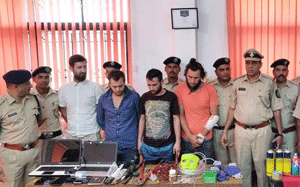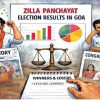Goa is abuzz with excitement as vintage bike and car owners, users, collectors and fans are decking […]

POLICE STATEMENTS IN DRUG CASES NOT ADMISSIBLE AS EVIDENCE!
April 17- April 23, 2021 April 16, 2021VICTIMIZED: Many foreigners are victimized by the Goa police who even threaten to plant drugs on them if their bribes are not paid!
By Advocate Vinayak D Porob
Till recently a statement recorded by police officers was admissible as evidence and adequate to convict those carrying, storing or consuming drugs. This allowed police to blackmail foreigners. Under a landmark judgment on Supreme Court statements of police officers, police statements may not be admissible as conclusive evidence.
RECENTLY, the Supreme Court in a landmark judgment of Tofan Singh v/s State of Tamil Nadu held that officers of the Central and State agencies appointed under the Narcotic, Drugs & Psychotropic Substances Act (NDPS Act) are police officers and hence statements recorded by them under Section 67 of the NDPS Act are not admissible in evidence. The apex court held that the officers who are invested with powers under section 53 of the NDPS Act are police officers within the meaning of Section 25 of the Indian Evidence Act as a consequence of which confessional statements made to them would be barred by section 25 of the Indian Evidence Act and cannot be taken into account to convict an accused under the NDPS Act.
By virtue of Section 53 of the Indian Evidence Act, the Centre after consultation with the State government, invests officers of any department with the powers of an officer-in-charge of a police station for the purpose of investigation of offences under the NDPS Act. Powers of an officer-in-charge of a police station while investigating a case includes power to arrest the accused and conduct custodial interrogation, which is very crucial in the process of investigation in a criminal case. Under section 25 of the Indian Evidence Act, 1872, no confession made to a police officer shall be proved against a person accused of any offence.
The legislative intent in incorporating and implementing Section 25 is to curb police atrocities, when the accused are in police custody and to prevent police officers from forcefully extorting a confessional statement from an accused who is detained in police custody. It would be catastrophic if police officers compelled every accused to give confessional statements which could be the basis of conviction, even if the said accused is innocent. When an accused is in police custody he is at the mercy of police officers and the police officers who can using third degree methods exhort and record any statement from an accused. If considered in law these extortions under duress decide the fate of all the criminal cases even before conducting trial by courts — the very purpose of establishing courts and the judicial system would be defeated.
LONG OVERDUE
UNDER the circumstance the aforementioned judgment should have been passed long ago, but better late than never! The Supreme Court has finally taken note of the abuse and misuse of the statements recorded by State and Central agencies appointed under the NDPS Act and have rightly held that the confessional statements recorded under Section 67 of the NDPS Act have no evidentiary value. This once again reminds us that the Supreme Court is the ultimate court of justice and it can cure the defects existing in the enactments of the legislature, considering all practical circumstances which the legislature sometimes fails to realize.
A large number of people are incarcerated and punished on the basis of statements forcibly extracted by using third degree, coercion and threats to individuals, undoubtedly violating their fundamental rights. The new act provides relief and justice to those people languishing in custody on the basis of such inadmissible statements.
In most of these cases apart from the confessional statement there is hardly any independent evidence or recovery. However, several downtrodden people are languishing in custody because of the so called confessional statement recorded by the police under coercion when in custody; therefore, the Supreme Court, being the ultimate Constitutional court, has rightly in the interest of justice tried to delicately balance the powers of the State and the Fundamental Rights of the citizens.
Narcotics Control Bureau (NCB) is a drug law enforcement agency and NCB is also entrusted with the responsibility of implementation of the provisions of the drug-related international conventions of the UN of which India is a signatory to. Article 47 of the Indian Constitution directs the state to endeavor to bring about prohibition of the consumption except for medicinal purposes of intoxicating drugs injurious to health. The NCB, which is a constitutionally appointed agency, is bound to perform its duties with utmost responsibility to delivery justice. However, in most of the cases registered by the NCB under the NDPS Act, confessional statements recorded of the accused, are utilized to incarcerate accused in custody for several years irrespective of the fact of whether the said statement was given voluntarily or recorded under duress and coercion.
DOING JUSTICE
SECTION 67 of the NDPS Act was abused by the NCB to its fullest and several innocent people were implicated as accused based on such confessional statements which prima facie appear to have been recorded under coercion. In the State of Goa itself cases have been registered by the NCB and the accused are languishing in custody in such cases because of the so called confessional statements recorded by the NCB.
This judgment passed by the Supreme Court will offer adequate relief to these accused who are languishing in custody on the basis of their confessional statements recorded by the NCB. Investigation in a criminal case has to be carried out in a free and fair manner and the interrogative statements recorded of the accused when in custody shall only be used for further leads in investigation and to detect and arrive at a logical conclusion in such crimes.
Such statements should never be the basis of conviction as no evidentiary value can be attached to such statements recorded of the accused when in custody and therefore, the Supreme Court at last in order to avoid false implication, has laid to rest the law on such coercive statements for which the citizens of India should be thankful for!
(Note: Vinayak D Porob is a Mapusa-based advocate in Goa)















